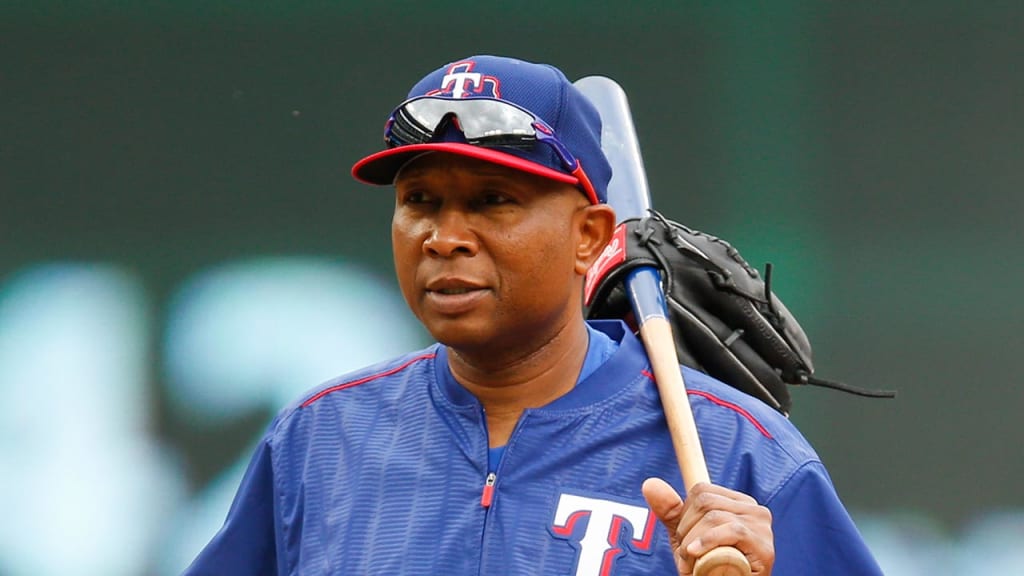
ARLINGTON -- Third-base coach Tony Beasley was back on the field for the Rangers this week, hitting fungoes, teaching the game of baseball and doing all things he loves to do.
His year-long battle with rectal cancer is over.
"I'm great," Beasley said after Thursday's workout at a local high school. "No limitations ... just happy to back in the fold."
The big day was Dec. 2. After three rounds of chemotherapy, radiation treatment and major surgery, Beasley and his wife, Stacy, had gone to Houston for the final tests and scans to see if he was cancer-free. The results of those tests were revealed Friday, three days before his 50th birthday.
"I went and did my MRI and CT scans," Beasley said. "They put the dye in to get a clear picture of everything, and they said, 'There is nothing on these scans.'"
That was the news Tony and Stacy Beasley had been waiting on for 10 months after he had first been diagnosed with Stage II rectal cancer just before Spring Training last year.
"It was incredible," Beasley said. "It was a special moment to hear those words and get that confirmation. I felt great. I know after the surgery [in June], my doctor told me the margins were clean and they had gotten everything. But until you have the actual scan, you don't know."
Beasley needed one more surgery on Dec. 5 -- his birthday -- to remove the medical apparatus that had been attached to his body during the treatments. Once that was done, the doctors prescribed six weeks of rest and then back to business as usual.
Beasley was just that during the Rangers' minicamp this week. Tuesday was the first day he was able to hit ground balls to his infielders and bounce around the field with everybody else. On Friday night, he will receive the Harold McKinney Good Guy Award at the Texas Rangers Awards Banquet.
"It feels great to be able to be actually be involved and not just be around," Beasley said. "Get your hands dirty again, hit fungoes, coach third base, the whole nine yards."
Beasley was around the Rangers last year when not going through treatment or recovering from surgery, but it was in a limited capacity. Class A Hickory manager Spike Owen stepped in as third-base coach and infield instructor.
Beasley served as cheerleader and morale booster, which was not an insignificant contribution. Beasley's unquenchable inspirational disposition is a major force in Texas' clubhouse culture, and that was especially true last year. Players saw a man who refused to let cancer get him down.
"I could have easily taking that approach, but I didn't," Beasley said. "I told my wife that from the very first moment when they gave us the news. She was upset and crying. I said, 'We just have to beat it.' I never got down. I prayed about it, surrendered it to over God. Didn't lose one night's sleep over it, didn't worry, didn't complain."
At first, Beasley planned to be back coaching third by June. His doctors soon set him straight on that notion. It was going to take much longer.
"That was disappointing, but at the same time, I said, 'I'm going to do what I have to do,'" Beasley said. "So every time something came up, I just said, 'Let's do it.' I never looked at anything as something I dread or I hate doing. I said, 'I'm going to get through it and it's not going to affect me the way they said it would affect me.'
"Radiation did, chemo didn't. It didn't pull me down, it didn't drain me, it didn't make me sick."
Beasley still faced many challenges through the year.
"It was challenging on many fronts," Beasley said. "But like I said all year, to be around the team as much as I could, be on the scene and have some sense of normalcy ... it was good therapy for me. If I was totally away and isolated, that would have been difficult. Every player, every coach, the front office, media [and] fans made it easy because of their support. ... That helped me tremendously."
Beasley said if there is one word that would describe the whole thing, it would be "recognition."
"I don't know if that's appropriate or not, but just really getting a clear picture of my life and every opportunity that I've had," Beasley said. "Just the basic functions of life: to be able to live and to see another day. Recognizing the importance of everything we take for granted. Every little nuance that we assume will happen. When those things become challenging and some are taken away, you have to recognize every day and everything is a blessing.
"In life, you go through things and have trials, but they can make us stronger and they can make us better. [I'm] thankful I had a great support group and people who cared and pushed me along. I'm also thankful I was able to keep a positive outlook from Day 1."